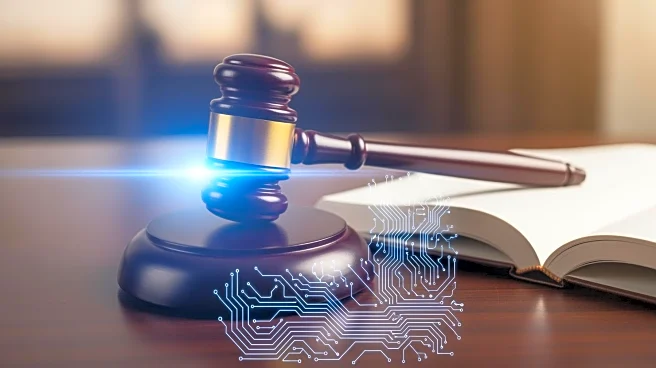What's Happening?
Kim Kardashian's recent failure to pass key law exams has sparked a debate about the use of generative artificial intelligence (AI) in professional settings. Kardashian, who is an aspiring lawyer, revealed that she used ChatGPT to answer legal questions
while preparing for her exams. She noted that the AI often provided incorrect answers, contributing to her failure. This incident highlights the growing trend of students and professionals using AI tools like ChatGPT for research and exam preparation. However, these tools, designed as prediction machines, can deliver plausible-sounding but incorrect information, leading to potential legal liabilities and undermining public trust.
Why It's Important?
The reliance on AI tools like ChatGPT in legal contexts raises significant concerns about the accuracy and reliability of information provided by these systems. Legal experts warn that AI-generated hallucinations can mislead users, resulting in incorrect legal advice and potential disciplinary actions. Kardashian's experience underscores the need for skepticism and verification when using AI for high-stakes decisions. As AI adoption grows, it is crucial to maintain traditional standards of professional responsibility to prevent misinformation and protect public trust in legal processes.
What's Next?
Despite the risks, generative AI is expected to remain a staple in professional practice. Legal experts agree that AI tools should be used as a starting point, subject to rigorous human verification, rather than as a substitute for qualified legal advice. Kardashian plans to retake the California bar exam, highlighting her determination to pursue a legal career. Her experience serves as a cautionary tale for students and professionals, emphasizing the importance of approaching AI outputs with skepticism and maintaining professional standards.
Beyond the Headlines
The ethical implications of using AI in legal settings are profound. Overreliance on AI could stunt the development of legal professionals, as the practice of law involves more than just looking up answers. The potential for AI to generate incorrect legal documents is already a concern, with instances of lawyers facing sanctions for submitting documents with non-existent citations. As AI continues to disrupt legal education, it is essential to balance technological advancements with the need for human expertise and judgment.















